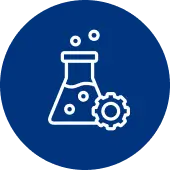Best Clinical Biochemistry Laboratory in Raipur, Chhattisgarh
Clinical chemistry (also known as chemical pathology, clinical biochemistry, or medical biochemistry) is the area of clinical pathology that is generally concerned with the analysis of bodily fluids for diagnostic and therapeutic purposes (not to be confused with medicinal chemistry). Pathology Lab in Raipur specializes in conducting these crucial diagnostic tests to aid in medical diagnosis and treatment.
Most current laboratories are now highly automated to accommodate the high workload typical of a hospital laboratory. Tests performed are closely monitored and quality controlled.
All biochemical tests come under chemical pathology. These are performed on any kind of body fluid, but mostly on serum or plasma. The serum is the yellow watery part of blood that is left after blood has been allowed to clot and all blood cells have been removed. This is most easily done by centrifugation, which packs the denser blood cells and platelets to the bottom of the centrifuge tube, leaving the liquid serum fraction resting above the packed cells. This initial step before analysis has recently been included in instruments that operate on the "integrated system" principle. Plasma is in essence the same as serum, but is obtained by centrifuging the blood without clotting. Plasma is obtained by centrifugation before clotting occurs. The type of test required dictates what type of sample is used.
Category of Test
- Electrolytes
- Liver Function Tests
- Cardiac Markers
- Minerals
- Blood Disorders
- Miscellaneous
Clinical Biochemistry & Immunology
The Division of Clinical Biochemistry & Immunology offers both qualitative and quantitative analyses of biological fluids, including blood, serum or plasma, urine, and tissues, to assess specific chemical components or physiological processes. Physicians rely on these test results for disease screening, diagnosis, and monitoring.
The Clinical Biochemistry & Immunology team also conducts applied research to develop new diagnostic laboratory tests aimed at identifying or tracking diseases, disease processes, or treatment effectiveness. Some examples of tests developed by laboratories associated with this division include:
- Assessment of immune factors related to diseases
- Evaluation of endocrine organ function
- Monitoring the effectiveness of cancer treatments
- Assessment of immunosuppression in transplant patients
- Evaluation of how genetic variations affect standard therapies
- Assessment of nutritional health
- Evaluation of drug and metal toxicity
Uses of Biochemical Tests
Biochemical tests play a crucial role in diagnosing, monitoring, and managing various medical conditions. Here are some common uses of biochemical tests:
- Disease Diagnosis: Biochemical tests help in identifying specific diseases by measuring levels of enzymes, hormones, electrolytes, and other substances in the blood or other body fluids.
- Monitoring Disease Progression: Regular biochemical tests can track the progression of chronic diseases, such as diabetes or liver disease, allowing for timely adjustments in treatment.
- Assessing Organ Function: Tests can evaluate how well organs like the liver, kidneys, and heart are functioning by measuring specific markers related to their activity.
- Detecting Nutritional Deficiencies: Biochemical tests can identify deficiencies in vitamins, minerals, and other nutrients, helping to guide dietary recommendations and supplementation.
- Evaluating Hormonal Imbalances: Hormone levels can be measured to diagnose conditions such as thyroid disorders, adrenal disorders, and reproductive issues.
- Screening for Genetic Disorders: Biochemical tests can identify metabolic disorders or inherited conditions, particularly in newborn screening programs.
- Assessing Drug Effects: Tests can monitor drug levels in the blood to ensure therapeutic effectiveness and prevent toxicity.
- Monitoring Treatment Response: Biochemical tests are essential in assessing how well a patient is responding to treatment, particularly in conditions like cancer.

